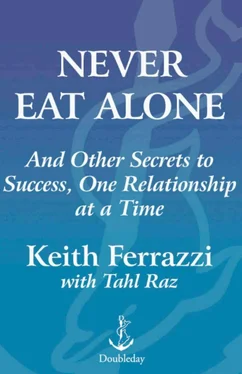Keith Ferrazzi - Never Eat Alone
Здесь есть возможность читать онлайн «Keith Ferrazzi - Never Eat Alone» весь текст электронной книги совершенно бесплатно (целиком полную версию без сокращений). В некоторых случаях можно слушать аудио, скачать через торрент в формате fb2 и присутствует краткое содержание. Год выпуска: 2005, ISBN: 2005, Издательство: C U R R E N C Y • D O U B L E D A Y, Жанр: marketing, на английском языке. Описание произведения, (предисловие) а так же отзывы посетителей доступны на портале библиотеки ЛибКат.
- Название:Never Eat Alone
- Автор:
- Издательство:C U R R E N C Y • D O U B L E D A Y
- Жанр:
- Год:2005
- ISBN:0-385-51529-4
- Рейтинг книги:4 / 5. Голосов: 1
-
Избранное:Добавить в избранное
- Отзывы:
-
Ваша оценка:
- 80
- 1
- 2
- 3
- 4
- 5
Never Eat Alone: краткое содержание, описание и аннотация
Предлагаем к чтению аннотацию, описание, краткое содержание или предисловие (зависит от того, что написал сам автор книги «Never Eat Alone»). Если вы не нашли необходимую информацию о книге — напишите в комментариях, мы постараемся отыскать её.
Never Eat Alone — читать онлайн бесплатно полную книгу (весь текст) целиком
Ниже представлен текст книги, разбитый по страницам. Система сохранения места последней прочитанной страницы, позволяет с удобством читать онлайн бесплатно книгу «Never Eat Alone», без необходимости каждый раз заново искать на чём Вы остановились. Поставьте закладку, и сможете в любой момент перейти на страницу, на которой закончили чтение.
Интервал:
Закладка:
Next, take ACTIOM It's called a Networking Action Plan for a reason. To prepare yourself to run a marathon, you must get out there and jog every day. With a plan in place, it's up to you to start reaching out. Every day!
Step Three: Create a Personal "Board of Advisors"
Goals, like everything else I write about in this book, aren't achieved alone. With a plan in place, you're going to need reinforcement to stay focused. As in any business, even the bestconceived plans benefit from external vetting.
It helps to have an enlightened counselor, or two or three, to act as both cheerleader and eagle-eyed supervisor, who will hold you accountable. I call this group my Personal Board of Advisors. They may be made up of family members; perhaps someone who's been a mentor to you; even an old friend or two.
My board came to my own aid at a critical juncture in my career after I left Starwood Hotels and Resorts, the company that owns such brands as the W Hotel and the Westin. I was adrift. For the first time in my life, I couldn't lay claim to a title or a job. I had to reassess my mission.
I had come to Starwood from Deloitte to accept what was an irresistible offer: to be the youngest chief marketing officer in a Fortune 500 company (a goal I had set for myself three years earlier) and reinvent the way an industry thought about marketing.
But my new job didn't go exactly as planned.
Juergen Bartels, the president at Starwood who recruited me, promised to mentor me and pave my way toward becoming a future leader of the company. My goals for the company were large and required changing an entire company's way of thinking.
Up until that point, marketing in the hospitality industry was a regional affair, often left to individual hotels. But the cost of that arrangement was a lack of company-wide brand consistency. Our plan was to consolidate our marketing functions under one roof with a global outlook. Rather than allow each of our regions around the world to set their own individual marketing strategies, I wanted to centralize our marketing operations more in order to clarify our message and create greater impact in the marketplace with a cohesive brand. After all, our primary customers—business travelers—were increasingly global and expected consistency.
Shortly after I was hired, however, Juergen Bartels left the company. Corporations, like any bureaucracy, tend to resist change, especially when the change doesn't have the support of top management. It became clear, a year into my job, that under the latest president I wouldn't be able to garner the kind of support within the company I needed for such a radical reorganization.
The new president made it clear that we would not be moving forward with our plan to reorganize the marketing department. The writing was on the wall for the plan and for me personally. Without the go-ahead needed to make the kind of bold decisions that I felt would ultimately lead to company success and a more senior personal position, I knew I wouldn't be able to reach my goals here.
I was shocked. I left work early that particular day and jogged mile after mile through the beautiful paths of New York's Central Park. Exercise has always been a refuge where I do some of my best thinking. But some ten miles later, I was still in shock.
The next morning, as I walked into the office, I knew that my future was somewhere else. All the accoutrements of a top executive's life—the large, cushy office, the mahogany furniture, the corporate jet, the fancy title on the door—meant nothing if I couldn't implement the ideas that made work fun, creative, and exciting. I officially resigned soon after, and if I hadn't, I know I wouldn't have been long for the company anyway.
It was time for me to establish a new goal. Should I seek out another position as chief marketing officer, proving myself by building bigger and better brands, striving for greater revenue (and profits), and helping to turn a company into a brand icon? Or should I set my sights even higher? My ultimate goal was to become a CEO. But it seldom happens for those in marketing. I had spent the greater part of my career convincing top management that marketing can and should directly influence all operating activities, yet I was not responsible for all of them.
To truly define the brand, the ultimate marketing job was to be the CEO. If I chose the latter direction, what else did I need to learn to become CEO? What were my chances of getting such a job? What sacrifices or risks were involved?
Honestly, these questions weren't clear to me at the time. In the wake of my disappointment, after years of go-go-go, I felt lost. I needed to figure out what I wanted to be all over again.
And I was scared. For the first time in ages, I had no company to attach to my name. I loathed the thought of meeting new people without a clear explanation of what I did.
Over the next few months, I had hundreds of conversations with the people I trust. I took a Vipassana meditation retreat where I sat for ten hours each day for ten days straight—in silence. For a guy like me, who can't shut up, it was torture. I wondered if I might fritter away all my time thinking. I wondered if I should go back to Pennsylvania and find a smaller pond to inhabit.
During that time I wrote a detailed twelve-page mission statement asking such questions as What are my strengths? What are my weaknesses? What are the various industry opportunities available to me? I listed the venture capitalists I wanted to meet, the CEOs I knew, the leaders I could turn to for advice, and the companies that I admired. I left all my options open: teacher, minister, politician, chief executive officer. For each potential new direction, I filled out a Networking Action Plan.
When everything was laid out, I reached out to my personal board of advisors. I didn't have the qualifications to be appointed a CEO with a major corporation. Yet when I looked inside myself, that was exactly what I wanted to do.
Sitting down with Tad Smith, a publishing executive and one of my best friends and advisors, I was told I had to get over the prestige of working for a Fortune 500 company. If I wanted to be CEO, I had to find a company I could grow with.
It was exactly the advice I needed to hear. I had been too focused on big companies. While the dot-com crash had made entering the digital world a whole lot less palatable, there were still some very good companies in need of business fundamentals. Now I knew this was where I needed to look, and I began refining my action plan.
From that day on, many of the calls I made, and the meetings and conferences I attended, were aimed at finding the right small company to call home. Three months later, I had five job offers.
One of the people I reached out to was Sandy Climan, a wellknown Hollywood player who once served as Michael Ovitz's right-hand man at Creative Artists Agency and who then ran an L.A.-based venture-capital firm called Entertainment Media Ventures. I had gotten to know Sandy during my time with Deloitte, when I was exploring paths into the entertainment world. Sandy introduced me to the people at a company called YaYa, one of the investments in his firm's portfolio.
YaYa was a marketing company pioneering the creation of online games as advertising vehicles. They had a good concept and the strength of committed employees and founders. They needed a bigger vision to get the market's attention, some buzz for their then-unknown product, and someone who could use all that to sell, sell, sell.
In November 2000, when the YaYa board offered me the CEO position, I knew it was the right fit. The company was located in Los Angeles, and it offered the sort of unconventional route into the entertainment world I had been looking for and a chance to bring my experience as a marketer to the CEO job.
Читать дальшеИнтервал:
Закладка:
Похожие книги на «Never Eat Alone»
Представляем Вашему вниманию похожие книги на «Never Eat Alone» списком для выбора. Мы отобрали схожую по названию и смыслу литературу в надежде предоставить читателям больше вариантов отыскать новые, интересные, ещё непрочитанные произведения.
Обсуждение, отзывы о книге «Never Eat Alone» и просто собственные мнения читателей. Оставьте ваши комментарии, напишите, что Вы думаете о произведении, его смысле или главных героях. Укажите что конкретно понравилось, а что нет, и почему Вы так считаете.












